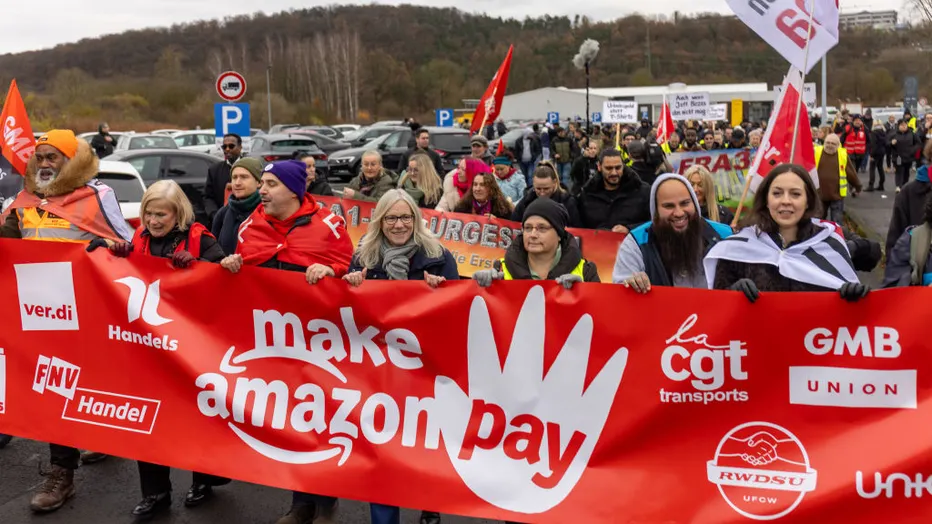As millions of shoppers take advantage of Black Friday deals, Amazon is facing a coordinated global strike spanning more than 20 countries. Organized under the “Make Amazon Pay” campaign, the protests aim to demand better wages, improved working conditions, and stronger commitments to environmental sustainability from the e-commerce giant. This is the fifth consecutive year that such actions have been taken during the peak shopping season, reflecting growing momentum in the labor movement against Amazon.
Coordinated Global Actions
The protests, organized by UNI Global Union and Progressive International, have garnered participation from thousands of Amazon workers, unions, and advocacy groups worldwide. Demonstrations are being held in major cities, including New York, Berlin, London, and New Delhi.
In India, hundreds of warehouse workers and delivery drivers gathered in New Delhi, demanding a salary increase from 10,000 rupees ($120) to 25,000 rupees ($295), along with improved safety standards and working conditions. Meanwhile, in Europe, strikes and demonstrations have disrupted Amazon’s operations in Germany, France, and Spain, where labor unions have long criticized the company for its high-pressure work environments.
Objectives of the “Make Amazon Pay” Campaign
The “Make Amazon Pay” campaign is centered on holding Amazon accountable for alleged labor abuses, environmental degradation, and anti-competitive practices. Organizers have outlined a set of demands, including higher wages, better job security, reduced carbon emissions, and more transparency in Amazon’s corporate practices.
Christy Hoffman, General Secretary of UNI Global Union, emphasized the growing strength of the movement. “This day of action grows every year because the movement to hold Amazon accountable keeps getting bigger and stronger,” she said. The campaign also seeks to highlight Amazon’s role in perpetuating economic inequality, particularly in developing countries.
Amazon’s Response
Amazon has dismissed the claims made by the “Make Amazon Pay” campaign, asserting that it offers competitive pay, comprehensive benefits, and a safe working environment. In a public statement, the company reiterated its commitment to addressing employee concerns and maintaining uninterrupted operations during the holiday season.
“We work hard every day to ensure we’re a great employer, providing competitive pay, excellent benefits, and career growth opportunities,” an Amazon spokesperson said. However, critics argue that the company’s statements often fail to align with the experiences of its workers, who report grueling work hours and intense productivity targets.
The Role of Climate and Environmental Concerns
In addition to labor issues, the “Make Amazon Pay” campaign also seeks to hold Amazon accountable for its environmental impact. The company, while committing to ambitious sustainability goals, has faced criticism for its contribution to greenhouse gas emissions through its extensive logistics network and energy use.
Protesters in several countries carried banners calling for Amazon to adopt more stringent climate policies, arguing that the company’s current efforts fall short of what is needed to combat the climate crisis.
Impact on Operations
The extent of the disruption caused by the strikes is not yet fully known, but the protests have the potential to affect Amazon’s delivery schedules during one of the busiest shopping weekends of the year. In previous years, similar strikes and walkouts have led to delays in order fulfillment and temporary warehouse closures in some regions.
While Amazon has implemented contingency plans to mitigate the impact, the growing scale of these protests underscores the company’s ongoing struggles with labor relations and public perception.
A Turning Point for Global Labor Movements?
The global nature of the strikes reflects a shift in how labor movements are organizing in the 21st century. By uniting workers across borders and aligning their demands with broader social and environmental issues, the “Make Amazon Pay” campaign aims to challenge one of the world’s most powerful corporations.
As these protests continue to grow in size and visibility, the outcome could set a precedent for how global companies address labor and environmental concerns in the years to come.
Sources:
- Amazon workers plan strike between Black Friday and Cyber Monday in major cities around the world
- Amazon workers in India join Black Friday strike action for better wages and working conditions
- Amazon workers in over 20 countries begin Black Friday strike
- Amazon workers in more than 20 countries plan Black Friday strikes and protests
- ‘Make Amazon Pay’ global protests and strikes to target Amazon’s anti-worker and anti-democratic practices

